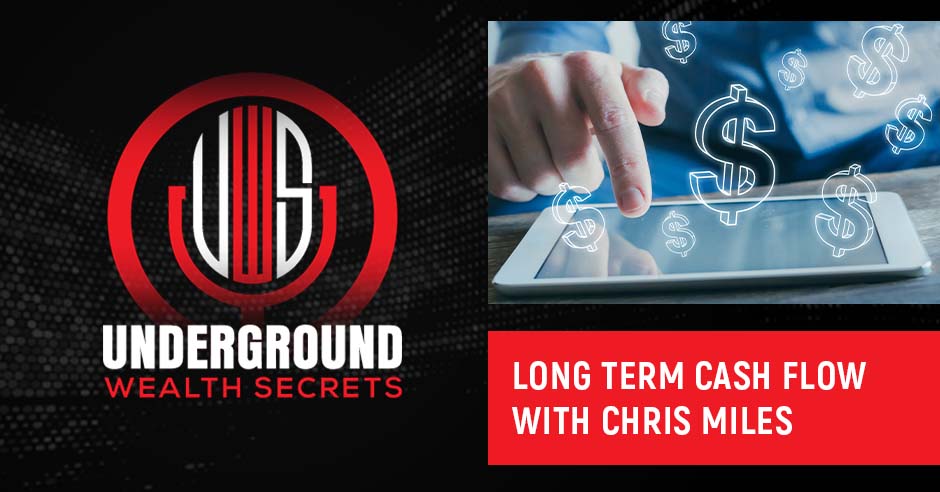Long Term Cash Flow With Chris Miles
- Post author By rldiamond
- Post date October 14, 2022
- No Comments on Long Term Cash Flow With Chris Miles

Chris Miles was once a financial advisor and a believer in mutual funds until he later found out that what he was teaching was wrong. Now, he believes the key to financial independence is long-term cash flow. It’s about generating passive income. In this episode, Julie Houston talks to the founder of Money Ripples about the power of long-term cash flow. Tune in and learn how you can start achieving financial independence so you can retire early and live life to the fullest!
—
Watch the episode here
Listen to the podcast here
Long Term Cash Flow With Chris Miles
I’m super excited. We have Chris Miles with us. Welcome to the show. It’s such an honor to have you
It’s great to be here.
Can you tell me a little bit about yourself and your background, where you came from, and where you’re at now?
I’m a Virgo. I do like walks on the beach. Aside from that, I grew up middle-class. I grew up in Oregon. My parents raised me well. They taught me good values. The one thing they did not teach me, but they didn’t have a good clue about, was money. There was always a scarcity of money when I was growing up. It’s always, “We can’t afford this. We think I am made of money. Money does grow on trees.” The worst one was my dad saying, “I’m going to work until I’m dead.” That was his belief. He thought he worked until he died, even though he was the penny-pinching saver. He was like Dave Ramsey’s older brother that Dave Ramsey looked up to.
This guy is penny-pinching, like crazy. You look them up in the dictionary, and there’s my dad. There is his picture right there with his little miserly scowl. He lives in that saver mindset. He is saving everything. He stuffed in his 401(k). He paid off his house early. I’m proud of that. Doing all that stuff, he always talked about how there was never enough money. I vowed as a kid never to be like him, like all teenagers. You always want to rebel against your parents and do the opposite.
After I dropped out of college with one class to go, it did not make my dad happy because I was supposed to be the first one to go to college. I dropped out to become an entrepreneur. I said, “What is a good entrepreneur business I can do?” The first one that came up that intrigued me was being a financial advisor.
I started doing that. I did that for several years, and the moment came. My dad says, “Chris, I need your help.” Rather than him giving me all that advice at his kitchen table, roles get reversed. I’m now sitting at his kitchen table there in Oregon and looking at his finances. He says, “Chris, here is my 401(k). I paid off the house. I’m debt-free. I have done everything I’m supposed to. Now what?” I said, “Dad, you’re 61 years old. If you tried to retire now, you better hope you die by 66 because, without the help of social security, you won’t be able to last more than five years.”
That’s not exactly what he wants to hear. He was like, “You got anything else?” I said, “Dad, I can put you in the market, but I can’t guarantee you’re going to have money growing in the market. It could go up. It could go down.” It’s different when you’re talking to clients. You can say, “In the long-term, the market goes up.” We all know that. The real thing was, “You’re my dad. I care about you. I can’t make a promise. I can’t make any guarantees.” No financial advisor can. We don’t know what’s going on. We’re idiots.
Being a penny pincher doesn't give you financial freedom. Click To TweetThat was the real wake-up moment for me because I realized, “My dad did everything right. He made Dave Ramsey blush because he was proud. He did everything he should’ve done, paying off his debt early, saving, and stuffing his 401(k). Yet, it wasn’t enough.” I started looking around. I said, “Let me look at all the rest of my clients.” Even the ones that I inherited from decades of previous financial advisors, they’re not financially free either.
It became apparent when one of my friends who was in real estate investing said, “Chris, none of your clients were financially free. How about this? How many of you guys as financial advisors are financially free, not of the commissions yearning, but these doing these mutual fund investments?” I looked around and said, “None.” Not even the guys who have been working there since the late ‘70s. They are still broke if they didn’t have commissions coming in.
That’s when it dawned on me. I am there too. I followed the same pattern as my dad, even though I vowed not to do it. Yet, here I was. I’m trying to be cheap and not turn on the AC in the summertime until I hit 80 degrees. My wife hates me. She wants to divorce me. No wonder I had been married three times. The guy was cheap. I’m a penny pincher myself. I was trying to save everything just so I could hit that elusive financial freedom, and that didn’t work.
At that point, I said, “I can’t be in integrity and teach this crap anymore.” I quit. I said, “I’ll never teach about money again. I will go back to teaching ballroom dancing and do mortgages as a mortgage broker.” That’s what I did. I know it’s an interesting combination. I was one of the nation’s top amateur ballroom dancers for several years and twenty pounds or so ago.
I wanted to know what I knew others did. It’s like the underground. There was this whole group of people I didn’t even know about. The guys in their 20s and 30s were financially independent doing real estate investing. I’m like, “Where were they before?” All of a sudden, because my friend woke me up, I started to find out there was this whole underground society of people that were financially independent. They were doing these things that financial advisors were hoping they could create for their clients. Yet, none of them were able to do, and that’s what I did.
I started learning from the. The next thing I knew, I was 28 years old, financially independent. I’m like, “What am I going to do with my life? What’s next?” That’s what led me down this path because people kept asking me, “How did you do it? How the heck are you retired at age 28?” That’s where I came out of retirement or coach people. Eventually, I launched Money Ripples, which is now hitting our ten-year anniversary in 2022.
You were able to retire at 28 to 29 years old.
That’s correct.

If I’m not mistaken, I know we talked briefly. You could retire two times.
The second time means I screwed up. It’s not enough to do at one time. You have to make sure that it wasn’t a fluke. In 2006 and 2007, anybody could say, “In the market helped you.” What would be a great comeback story if I were to go over $1 million in debt and my real estate goes upside down because I started gambling in my real estate instead of going for cashflow? The next thing I know, I’m in the hole. I had a dig back out of it. I didn’t file for bankruptcy, but I did have to pay back over $1 million of debt, and I had to do it again the second time by the end of 2016. It did take me a little while. That’s why I say, “I had retired twice by the time I was 39.” It’s because I screwed up and I had to prove that it works.
Tell us more about Money Ripples. What exactly do you do with that? What does this success to wealth or this road to wealth that you discovered?
The big thing that helped me to do it twice is every time I focus on cashflow, and I know that’s not an unfamiliar term on this show, but creating passive income. I realized from the last recession, the Great Recession, was not a great time to become an active investor. I realized for myself that I wasn’t good as an active investor. I was a horrible property manager. I was not the guy to collect rent checks.
I found out that doing the past stuff where I could get turnkey rentals instead of where a property manager does it for me or investing in syndications, whether in apartment buildings, self-storage, or oil and gas, which now has been awesome. All those kinds of things I can do, land flipping and things like that, where I go into business partnerships, let them do the work, and I become the financer. I found out that for me, that was my sweet spot.
I love being a teacher. I love teaching people and guiding people. We have a good ability to see this big picture and almost create this anti-financial plan. The financial plans are always about selling you mutual funds. It’s like bad Mexican food. They use the same ingredients, but however the package, it’s either taco or burrito, has the same ingredients. They don’t change it up much, but this gives different names.
That’s what financial advisors do. They give you the same old crap of annuities, mutual funds, and insurances, and give you a million different names, make it seem like it’s sophisticated, but in truth, they are simple, lackluster, mediocre returning high-risk types of products that they’re selling you. They’re salesmen and suits.
The way to do it is, if you can create real passive income now, you can do that. For example, we have a guy on our podcast. His name is Dan. He retired as a Colonel in California as he was the highest-ranking Colonel in the National Guard, which means he doesn’t get any of the pomp and circumstance. He’s the one that gets the 3:00 AM phone calls.
Financial advisors are just salesmen in suits. Click To TweetHe lived in his own rat race until he was about 60, when he was able to retire. He was like, “Chris, I have $1 million that they gave me in my retirement fund.” He did a good job saving. He said, “The problem is that me with a financial advisor, you’re saying I can live on about $30,000 a year if I don’t want the money to run out.” If you think about it, financial advising says, at least real financial advisors, the ones that are keeping up with the times, “You should not pull out more than 3% a year from your funds.”
It used to be the whole 4% rule. That rule is dead. Even several years ago, we were questioning that rule. The whole 4% rule would be fire financial independence to retire early. Do you hear that movement going on with other people in their 20s and 30s, the Millennials especially? That’s a dead number. That number does not work. If you’re going to retire that early, it should be a 2% rule, not 4%, because if you’re putting your money in mutual funds, they’re not going to return if you’re trying to preserve capital, or if you’re even worse, people are putting 70% in stocks, even when they’re in their 80s. It’s a horrible idea.
Two percent is where you should pull out, but 3% in his case. Three percent is $30,000 a year. A millionaire is $1 million, yet, he is told to live at a poverty level, $30,000 a year before taxes come out. Maybe $2,000 a month. He said, “Chris, I know there is got to be a different way. Hear me on another podcast interview.” He reached out. We ended up going over his numbers and putting them in different deals. He ended up doing something like oil and gas, some syndications there. He did a few turnkeys. Some other apartment-type syndications and whatnot.
The next thing you know, as of the update, we did an episode for him. He is now netting $11,000 a month, completely passive, no active type of stuff. I know some people will say, “Create passive income.” They say, “Let’s set up a whole new job for you. Set up a whole business wholesaling or flipping properties.” That is not passive. That is active income.
He is completely passive, hands-off, and making $11,000 a month. His goal was $10,000. He’s making $11,000, not $2,000, but $11,000 a month. It’s always about cashflow. That was the big epiphany for me when I left the financial advising world was when I broke away from that mold, and everything made sense. That’s when everything came together, and there’s hope.
That’s when I could even see a situation guys like my dad, even though my dad was too late when he did. I could see situations of other people said, “We can get you there.” Even if you’re not there yet, like in Dan’s case, he did it in six months. Even for other people, what if it takes 5 or 10 years versus never years, which is typical financial planning?
I don’t think that a lot of people consider and look at the long-term financially at all. They will teach you that grownup. They don’t teach you that in the schools. Nobody teaches you how to build financial freedom. It sounds like, in everything you said, the key is in passive income.
I recorded a podcast where I went in-depth. I put mutual funds on trial. I said, “If this works, there should be evidence and witnesses.” As I went through the evidence, the one thing is when you put in the actual retirement calculators and you put in real numbers, this is what got me out of business, and what got me doubting when I was teaching is if I put in real numbers of inflation, there was less hope. If I put in real numbers of the stock market returns, there was also less hope.

For example, I was always taught as a financial advisor, and we were teaching everybody that the market returns 10% or 12% on average. They would say that they have been that way since before the great depression. They even showed the great depression with the charts and stuff. Real estate only does 3%. They suck.
I did the numbers again on the S&P 500. The real rate of return average for the last several years is not 10% or 12%. It’s about 7.7%, much less. Most people are saving in funds that also have fees. Even if you’re in a 401(k), they sometimes have massive administration fees of 1% to 2%-plus a year. Most people with a 401(k) and their blends and stuff usually don’t make much more than 6% a year. I ran those numbers on my podcast showing if you want to be able to have a $90,000-a-year lifestyle in nowadays’s dollars, assuming a 5% inflation rate, because we all know they lie about inflation, it’s way more than 5%. I was playing devil’s advocate against my point.
5% inflation and 6% return in the market. To be able to have $90,000 a year after inflation dollars lifestyle, you have to save about $7,500 a month. You have to save $90,000 a year to live on $90,000 a year and make sure you don’t run out of money. Isn’t that insane? Everybody has been max funding their 401(k) by putting in $20,000 a year. Even to get a match, you only can only pull out about $20,000 a year. This is what I’m finding consistently. This is different than when you invest for cashflow because if you have $100,000, you make a 10% return, which is a baseline for passive investments.
Most of them pay more, but we’re like, “If you only make 10%, that’s still $10,000 a year on $100,000, not $3,000 a year for trying not to run out of money.” It’s different. You’re making better than 6% to 7%, even with the match. The 401(k) match only adds about 2% or 3% return. If you max fund your 401(k) and get a match, it generally adds about 1% to 2% return overall. You got the 7% or 8%. It won’t cut it. You’re right. People don’t talk about this.
I’m sure you’re probably going to lead to this, but I found four stories of people. I was looking for evidence and witnesses. I found four stories of people that retire with at least $1 million to $2 million. The crazy thing is every single one of them, even though they went beyond. The median balance of a 401(k) for a 65-year-old is about $90,000. Do the math. That’s $2,700 a year you’re pulling out. That’s the median. That’s the person right in the middle of what they’ve saved for years in a 401(k).
These people had $1 million to $2 million. Yet, they were all worried about inflation. They were worried about how to cut back on expenses and everything. They still had all the words. They were not financially free. Even the ones that were closer. The funny thing is they all had pensions. It was like they saved it in the retirement fund. They had some bonus pensions coming.
They were government workers. They got a pension from that because they are retired police officers. They all have pensions. They’re all relying on social security. Not once. Did you see somebody who says, “I can live on my retirement account?” That was never the case. It’s proven. It doesn’t work. That’s why you need alternative investments like what we talk about here.
I could be wrong, but I think mindset plays a big role in that because people are not trained to think outside the box. I know people that make $30,000 to $35,000 a year. They get a $2 raise. They are excited through the roof. They are living paycheck to paycheck. They were like, “I’m happy. This is it.” I have other friends who make good money, and they were like, I will have $1 million in my 401(k) by the time I retire, and I will be good. I’m thinking $1 million when you retire. Even if you’re in your 50s or 60s, you’re limited on what you’re going to do and what you can live off of. House paid off, and everything is a significant, probably income drop than what you’re used to.
No one says that they can live on their retirement account. It just doesn't work. That's why you need alternative investments. Click To TweetNo wonder why a quarter of people that are over the age of 65 are still working. They have to do something to stretch it out. My dad, in his mind a little bit unfortunately, he is now 78 in 2022. He is trying to stretch out every little bit. He is using your Medicare, VA, and social security. He tries not to let all of his money run out. He is trying to stretch as long as he can while he is bedbound. That’s not the life that I want people to live. I don’t want people to be alive, yet, not living.
This is about how to create freedom and life now. Just like my sign says here, “Live your life now, not tomorrow.” How do we create that? It’s nobody’s fault. The only people’s fault is the financial institutions who have taught financial advisors and financial experts, even the ones you see on the money shows, telling you and trying to sell you. They’re not even telling you. They’re selling you on this dogma. It’s almost like a religion in the sense that they’re saying, “Keep doing this. It’s going to work.” We don’t have the evidence. It has not worked yet. 401(k) has been around since 1985 for the average American. Several years later, how are they doing this? It’s not working.
I see too many people, especially in their 60s. Years ago, I worked with someone. They were in their 60s. They were 65. They still had to get up every day and go to work. They were like, “I cannot afford to retire at all.” I don’t want to work in my 60s, 70s, and 80s. That’s me, personally. I’m with you. I think that passive income, a lot of people aren’t even open to it. They’re scared, or their mindset is not in the right place. What are some of the things you focus on with the people you work with as far as changing their perspective, getting them in this mindset and system that you use successfully?
We got to do what we did, which was blowing up the island. Realize that there is no island. That little retirement island you want to try to retire on, if you use mutual funds, the island will be the island in the middle of a freeway. That’s going to be your island. You will set up a little tent. They will be cheap. You can afford it.
If you want that freedom, you do have to change that mindset. The first thing is looking at how to get your money out of prison. Understand that every fund institution, every financial expert, and an advisor will tell you if they have been trained, taught, and educated to tell you to lock up your money in those IRAs and 401(k)s. If you touch them for your 59-and-a-half, bad boy or bad girl, you get a 10% penalty and taxed.
It’s your money. Why should you be penalized for protecting your own money? They don’t even give you a real tax break. They delay your taxes to later, which we all know with inflation alone, even if they don’t change the tax rates, because you have to spend more and it puts you in a higher bracket automatically unless you’re making millions of dollars now and you live on tens of thousands of dollars later. That’s the only way somebody gets cheaper with taxes later on. It’s a complete scam.
Getting your money out of prison, getting your money out of the equity of your home, potentially. That’s one thing that that guy did. He was like, “You have $1 million a year, but I can even leverage some of the equity for my home, not pay off my mortgage.” Instead, refinance it, fix the rate, but get some cashout that I can invest and help me pay for my mortgage payment if not pay it completely. Things like that, getting your money out of prison, and getting it unlocked are the first thing.
Once we find out what available resources there are, we want to put them in good, safe, real asset-backed places. The reason why we talk about real estate so much even though we don’t offer real estate options. Here is a key thing. We’re not investment advisors. We don’t even raise capital. We don’t raise money. We don’t have funds or anything like that to invest in. We are purely strategists and connectors. We have our own vetted team of investment professionals, people we’ve vetted over the years that have a good track record.

For example, even during the last recession, they were still paying out to their investors. The hard thing is that many people, especially in the real estate game, have shown up since 2018. All of a sudden, they think they’re amazing. This is what we’re talking about before we go on air. They’re like, “I did three deals. You should invest in me.” It’s like, “Congratulations. You happen to pee with the wind, and the wind carried the pee away.” That’s the problem.
There are many people that think they’re amazing. That’s the same thing as the stock market and crypto. Everyone was going, “I’m amazing.” No, you did nothing. You were not smart. You rode a wave. The question is, what do you do when the wave pulls back? When the tide rolls back, are you going to get the one caught swimming naked, as Warren Buffett says, or are you going to be a person that says, I’m prepared for this, I know how to handle this and how to pivot? Those are the kinds of people you want to invest with if you’re going to put your money anywhere.
We look for asset-backed things with good deals. When I say asset-backed, I want to make sure that they have real assets. We’re not investing in arbitrary numbers like stocks. I used to be a stock trader. I used to teach people how to trade stocks and options. The best traders in the world maybe do 20% to 25% a year consistently over time. Even George Soros, people know him from a good and bad reputation. George Soros, who does trading in foreign exchange markets, has only an average of 24% to 25%. Buffett is the same thing. People hail Buffetts for being the greatest investor of our time.
Buffett invests in businesses, not stocks. He is better than you are. Most people don’t make more than 20% a year. If they’re amazing in some of the best in the world, people still buy this philosophy that it works. No, you’re riding waves. You’re not buying anything that you have security. That’s why we want real assets like real estate. We know it’s going to have value. Even when things tank the value, it still cashflows. That’s an important thing. People say, “Real estate values. What if they come down?” Who cares? If they’re profitable, who cares if they come down? If it’s a multi-family, they’re profitable. The value goes up because it’s based on profit. It’s like a business.
You want things that have real, tangible value. We’re not talking about buying crypto. We have plans to do that, but it’s not something that they’re banking their wealth on, which is what the average American is trying to do. They try to bank on stocks, bonds, mutual funds, and crypto. They try to bank on the things they have no control over and the things that you can invest in. I like to invest in things that banks like to invest in. The things that they will put their own money into, which they will give loans for.
The banks never put money in the market. What I used to teach as a financial advisor is they put your money in the market and become the number one investors in the market. They charge you a fee guaranteed. In real estate, if you look at what they are willing to lend you money for, which is their money, they are willing to lend money on businesses that have a good plan. They are willing to lend money to real estate and on things that have real backing to them. They want real assets. We shouldn’t be any different. We should invest like a bank.
One of the strategies that we have people do is to help even enhance the returns. We will do like infinite banking where banks have done the same thing for years. They double dip on their investment returns because you can borrow from your own cash and get a bank line of credit against your savings at a lower rate than what they’re paying you. If you’re going to pay 6%, but you get charged 5% on loan, you make a spread, and you can still take that money and invest it, make an extra 1% to 2% plus on the money you’re already making on your investments.
That is mind-opening for a lot of people. If you could share maybe 1 or 2 tips that you would say to our readers, what would those 1 or 2 tips be?
If you use mutual funds, that little retirement island you want to retire on will be in the middle of a freeway. Click To TweetThe first is to find out where your money is. Understand where your money is and what’s locked up, even if you don’t know what to do with your money. Let’s say you have it in the stock market right now, in mutual funds. I told people on August 16th, I said, “The market is going to start dropping even lower than it did before.” In the last few weeks, what have we seen? The market is dropping. People are now down about 20% for the year, if not more.
If you’re in the market and you don’t know what to do, at least preserve what you have. We can’t give investment advice, but I will look at ways to preserve the money. If you’re trying to buy yourself some time to decide where to invest, buy yourself some time, move it to somewhere safe. It could be like cash, a money market fund. I would not even trust bonds right now. Bonds have lost money in 2022. This happened last recession. It’s happening again. The thing that’s supposed to be safe is not safe, either. Look at those things that are trying to preserve your money. You don’t lose any more if the market decides to go down while you’re trying to get educated.
The second thing is to get more education. Understand what you’re doing. If you say, “I’m tired of education. I’m ready to take action.” Find someone to guide you. Whoever that would be, find someone that can give you some guidance and help you figure out where that money could go and what opportunities are there that can generate real passive income now.
Chris, that was some incredible background and knowledge that you shared. I want to thank you for being on our show. It was such an honor to have you on and such a pleasure being with you here.
I appreciate it you let me rant, Julie.
It was great. I know our readers are going to love this. Thank you again for being with us.
It’s a pleasure. Thanks.
Important Links
- UndergroundWealthSecrets.net/Ripples
- UndergroundWealthSecrets.net/freecourse
- UndergroundWealthSecrets.net/facebookpage
- UndergroundWealthSecrets.net/TikTok
- UndergroundWealthSecrets.net/Youtube
About Chris Miles
 Chris Miles, the Cash Flow Expert and Anti-Financial Advisor, is a leading authority teaching entrepreneurs and professionals how to get their money working for them TODAY! He’s an author, podcast host of the Chris Miles Money Show, has been featured in US News, CNN Money, EOFire, and has a proven reputation with his company, Money Ripples (http://www.moneyripples.com/) getting his clients fast, life-altering financial results. In fact, his personal clients have increased their cash flow by over $200 Million in the last 10 years!
Chris Miles, the Cash Flow Expert and Anti-Financial Advisor, is a leading authority teaching entrepreneurs and professionals how to get their money working for them TODAY! He’s an author, podcast host of the Chris Miles Money Show, has been featured in US News, CNN Money, EOFire, and has a proven reputation with his company, Money Ripples (http://www.moneyripples.com/) getting his clients fast, life-altering financial results. In fact, his personal clients have increased their cash flow by over $200 Million in the last 10 years!







